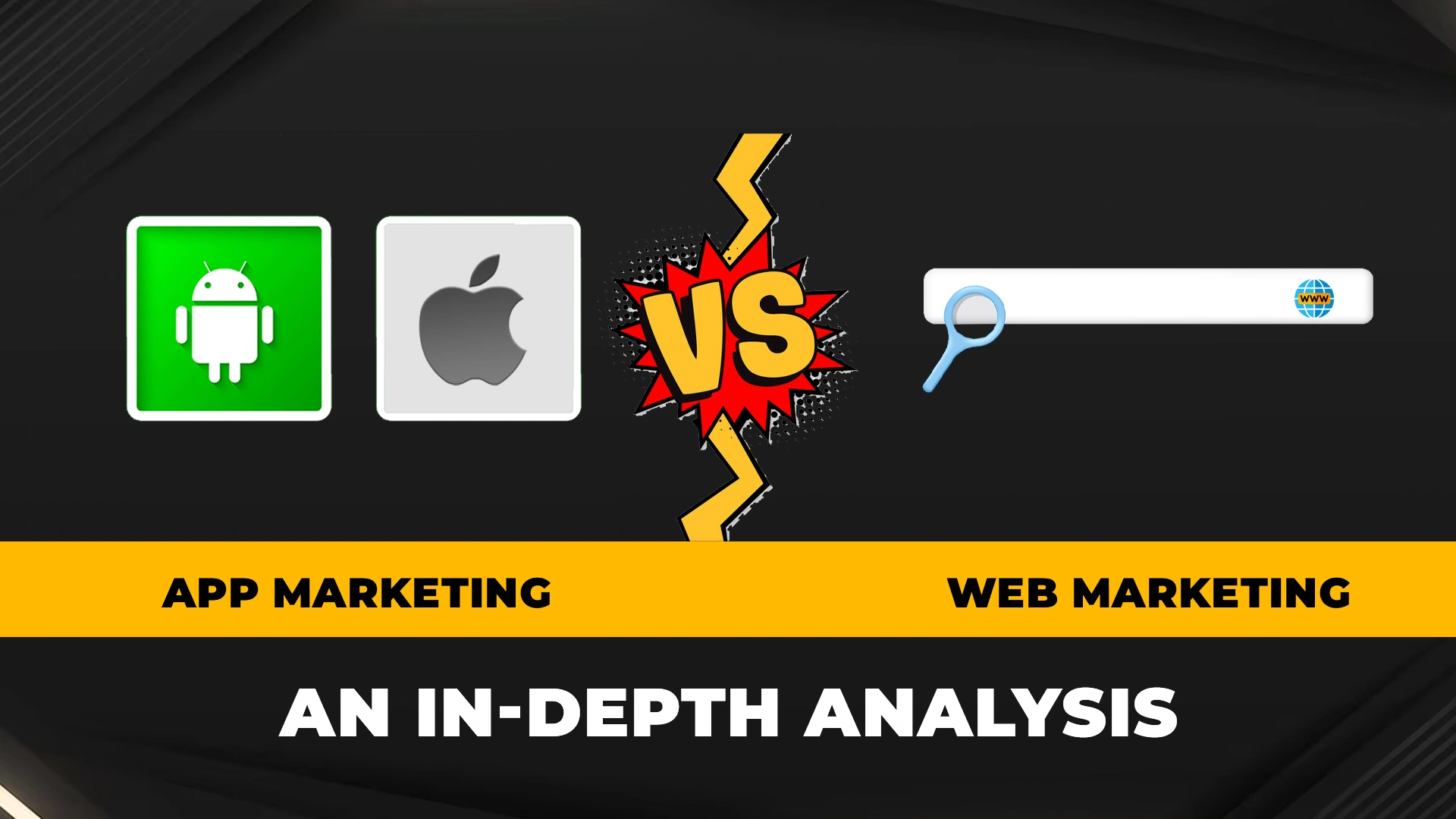Understanding the difference between web marketing and app marketing is pivotal for businesses aiming to establish a robust online presence. This exploration delves into the core concepts of web and app marketing, dissecting their unique strategies, objectives, and the distinctive features that set them apart.
What is Web Marketing?
Web marketing, or online marketing, refers to the promotion of products or services through digital channels such as websites, search engines, email, and social media. Its primary goal is to attract, engage, and convert visitors into customers through various online strategies.
What is App Marketing?
App marketing focuses on promoting mobile applications to drive downloads, user engagement, and overall app success. It involves leveraging strategies specific to app stores, user experience optimization, and in-app advertising to reach and retain a target audience.
App Marketing vs Web Marketing:
Differences in User Behaviour on Apps vs Websites:
User behaviour varies significantly between apps and websites. Apps often demand more immediate and interactive engagement, while websites cater to diverse user intents, providing information, products, or services.
Demographic Considerations for App and Web Users:
Understanding the demographics of app and web users is crucial. Apps might appeal more to younger audiences, while websites might have a broader demographic reach. Tailoring marketing strategies to these differences is essential.
Accessibility and Convenience
Apps provide unparalleled accessibility on mobile devices, allowing users to access functionalities instantly. This ease of access contributes to the popularity of apps for on-the-go tasks. Web marketing, on the other hand, ensures a broad reach across various platforms, making it accessible through desktops, laptops, and even mobile browsers. This versatility contributes to its wide audience base.
User Engagement
App marketing focuses on in-app engagement strategies, including personalized notifications, gamification, and user-specific content delivery to keep users actively interacting with the app. Whereas Web marketing emphasizes website engagement through compelling content, intuitive navigation, and strategically placed calls-to-action to guide visitors through the desired user journey.
Metrics and Analytics
App marketing relies on metrics like install rate, retention rate, daily and monthly active users, and churn rate to measure success and refine strategies for optimal performance. On the other hand web marketing success is measured through metrics such as page views, bounce rate, conversion rate, and user behavior analytics to gauge the effectiveness of the marketing campaign.
App Marketing Strategies
App Store Optimization (ASO): ASO is paramount for app visibility in stores. Optimizing app titles, descriptions, keywords, and visuals enhances discoverability, driving more downloads.
Case Studies of Successful ASO: Examining successful ASO case studies provides insights into how top-performing apps have mastered the art of optimization for increased visibility and downloads.
In-App Advertising: In-app advertising comes in various forms, including interstitials, banners, and rewarded videos. Understanding these formats helps tailor advertising strategies to fit user preferences. Exploring successful in-app advertising campaigns sheds light on innovative approaches that captivate users and deliver tangible results.
Social Media Integration: Integrating apps with social media platforms is a powerful strategy. Leveraging the vast user base of social platforms can exponentially increase app visibility and downloads.
Cross-Promotion and Collaborative Strategies: Collaborative efforts and cross-promotion with other apps or brands amplify reach. Strategic partnerships can lead to mutually beneficial outcomes for all parties involved.
Web Marketing Strategies
Search Engine Optimization (SEO): SEO is integral to web marketing success. Optimizing content, meta tags, and ensuring website responsiveness contribute to higher search engine rankings. Analyzing successful SEO case studies unveils the strategies employed by high-ranking websites to achieve top positions in search engine results.
Content Marketing: Content marketing involves creating valuable, relevant content to attract and engage the target audience. Crafting compelling narratives and providing solutions to user queries are key. Effective content distribution strategies involve utilizing various channels, such as social media, email, and guest posting, to maximize content reach and impact.
Email Marketing: Email marketing remains a potent tool for building and nurturing a web-based audience. Capturing leads through opt-ins and delivering personalized content fosters audience loyalty. Executing effective email marketing campaigns involves segmentation, personalization, and crafting compelling messages to drive user engagement and conversions.
Challenges and Considerations
Technological Challenges in App Marketing: App marketing faces unique technological challenges, including device fragmentation, operating system updates, and ensuring compatibility across various mobile devices.
Rapid Changes in Web Marketing Algorithms: Web marketing algorithms are in a constant state of evolution. Keeping abreast of changes in search engine algorithms is essential to maintain visibility and relevance.
Adapting Strategies to Industry Trends: Adapting marketing strategies to align with industry trends ensures relevance. Staying ahead of emerging technologies and consumer preferences is crucial for sustained success.
Future Trends
Emerging Technologies Influencing App Marketing: Exploring emerging technologies such as augmented reality (AR), artificial intelligence (AI), and 5G sheds light on how these advancements will shape the future of app marketing.
Innovations in Web Marketing Practices: Innovations in web marketing, including voice search optimization, video content, and interactive user experiences, showcase the evolving landscape and offer new avenues for businesses to explore.
Convergence of App and Web Marketing Strategies: The convergence of app and web marketing strategies signifies a holistic approach. Businesses increasingly recognize the importance of integrating both channels to create seamless, omnichannel experiences for users.
In conclusion, understanding the intricacies of web and app marketing is essential for businesses aiming to thrive in the digital realm. By tailoring strategies to the unique characteristics of each platform, businesses can maximize their reach, engagement, and overall success in an ever-evolving digital landscape.
FAQ’s
What is the difference between App Marketing Vs Web Marketing
App marketing promotes mobile apps for downloads and engagement, while web marketing promotes products or services online through websites and digital channels.
What is a mobile app marketing strategy?
Key strategies in mobile app marketing include App Store Optimization (ASO), in-app advertising, social media integration, and cross-promotion to drive downloads and engagement.
What are web marketing strategies?
Essential strategies in web marketing include Search Engine Optimization (SEO), content marketing, and email marketing to attract and convert online audiences effectively.

